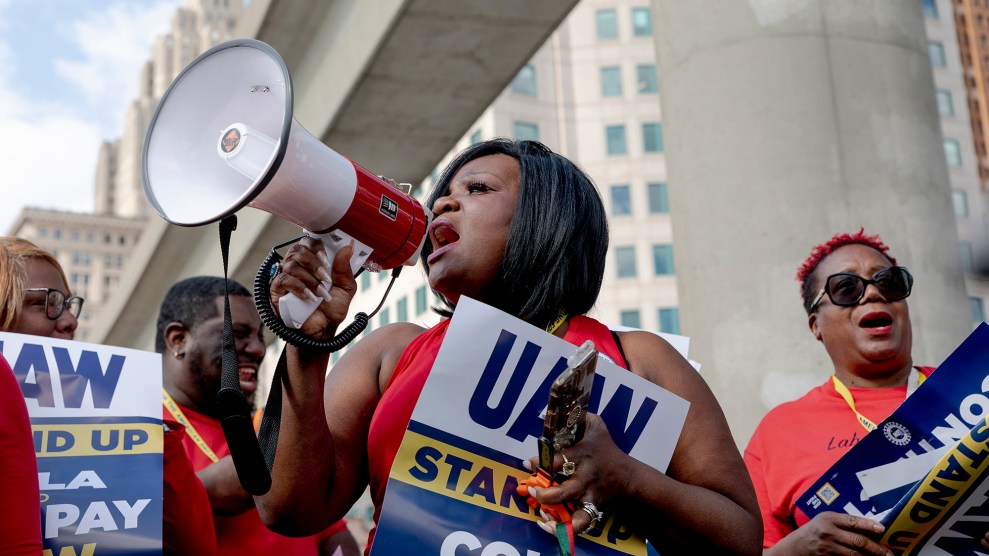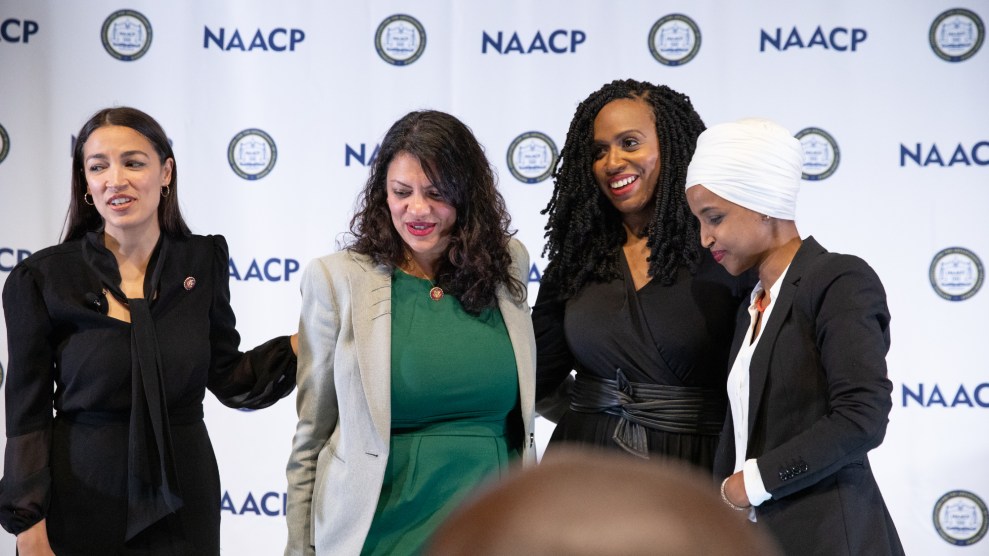
Members of the UNITE HERE Local 26 hospitality union protest outside the Park Plaza hotel in Boston, MA on September 1, 2024. Jason Bergman/SipaUSA/AP
Around 10,000 hotel workers went on strike over Labor Day weekend, picketing for better pay and working conditions in 25 hotels across nine cities, including Boston, Baltimore, San Francisco, Seattle, and Honolulu. UNITE HERE, the country’s largest hospitality union, had conducted several months of unsuccessful contract negotiations with leading hotel chains such as Marriott, Hilton, and Hyatt before escalating the dispute. The strikes, which lasted between one and three days, took place over the last holiday weekend of the summer and involved housekeepers, front desk attendants, bellhops, restaurant staff, and other hotel workers.
At issue, union officials say, is that while the hospitality industry’s profits have recovered from the extreme downturn during the pandemic, it has maintained the service and staffing reductions from that period. As a result, workloads for employees have increased while pay has stagnated.
“Many [workers] can no longer afford to live in the cities that they welcome guests to, and painful workloads are breaking their bodies,” Gwen Mills, the international UNITE HERE president, said in a statement. “We won’t accept a ‘new normal’ where hotel companies profit by cutting their offerings to guests and abandoning their commitments to workers.”
The weekend strikes could herald more to come—potentially also in New Haven, Providence, and Oakland—if contract negotiations continue to be difficult to resolve. In press releases, UNITE HERE highlighted last summer’s rolling strikes that impacted 65 hotels in Los Angeles, during which the union conducted brief work stoppages around the city over several months. Eventually, workers won wage increases of up to $10 more per hour over the five-year contract.
As the Labor Day weekend strike unfolded, Michael D’Angelo, Hyatt’s head of labor relations for the Americas, told AP, “We are disappointed that UNITE HERE has chosen to strike while Hyatt remains willing to negotiate.” The AP also reported that a Hilton spokesperson said that the chain was “committed to negotiating in good faith.”
The Covid pandemic all but halted the hospitality industry, as occupancy rates hit historic lows. The union says that the industry has largely rebounded, with gross profits in 2022 surpassing those from 2019. But, the union found that staffing has not returned to pre-pandemic levels, which they say creates a higher burden for those who remain in the industry. And while responsibilities have increased, many workers say that wages have not kept up with rising costs.
Edwin Solis, who works in the housekeeping department at the Grand Hyatt in San Francisco, said that life in the Bay Area has become increasingly expensive. “Everything goes to groceries and gas,” Solis said. Over the weekend, Solis was among hundreds of union members who were demonstrating downtown, some of whom wore signs that read “respect our work” and “one job should be enough.” Solis told Mother Jones that to make ends meet many of his coworkers have taken on second jobs. He was frustrated that the industry’s increased profits have not translated to higher wages for employees.
The industry trade organization, the American Hotel and Lodging Association, said that a May survey of hoteliers revealed that 86 percent of respondents had increased wages over the past six months—though they did not specify by how much—and 67 percent said they were experiencing staffing shortages.
As the cost of living has surged in the aftermath of the pandemic, higher pay has become a top priority for UNITE HERE. Josh Stanley, a union leader in Connecticut, explained that “while wages have grown somewhat, in terms of real buying power, they are lower than they were in 2020.” The union’s Hawaii chapter said that a survey of nearly 4,000 members found that 76 percent could not afford an unexpected bill of $500.
The “decentralized” hospitality industry poses a unique challenge for labor unions because each hotel negotiates its own contract with workers, according to Richard Hurd, a professor emeritus at Cornell’s School of Industrial and Labor Relations. In recent decades, UNITE HERE has made an effort to coordinate contracts across all the unionized hotels in each city. This has also given the union a leg up, Hurd said, as several contracts negotiated before the pandemic have ended around the same time. “Now they have a critical mass of cities where contracts had expired, where they believe they can use some leverage by staging strikes,” Hurd says.
“Now they have a critical mass of cities where contracts had expired, where they believe they can use some leverage by staging strikes.”
Hurd also noted that UNITE HERE, in line with the hospitality industry at large, has a high proportion of women and immigrant members, which has been reflected in the union’s leadership and priorities. Mills, the union’s first female president, noted in a statement about the strikes, “Hospitality work overall is undervalued, and it’s not a coincidence that it’s disproportionately women and people of color doing the work.”
In Honolulu, about 5,000 workers from seven hotels went on a three-day strike, from Sunday to Tuesday. Nerissa Acdal, who has been a housekeeper at the Westin Moana Surfrider for nine years, was among them. She said that she regularly works “exhausting” ten-hour shifts, cleaning sixteen rooms in a day. Acdal told Mother Jones that mandatory overtime has become commonplace after the pandemic, and she often skips lunch to finish her work on time.
During the pandemic, many hotel guests chose to opt out of daily room cleaning—a practice that continues today. In fact, union members say several days without housekeeping creates even more work when a guest checks out, but managers often don’t offer staff additional time to finish the job. “We don’t have any choice,” Acdal says. “We have to rush.”
UNITE HERE has pointed out that the pressure to compensate for inadequate staffing can result in worker injuries. Francisco Tobin, who runs banquet events, has spent thirty years working at the Hyatt Regency in Greenwich, Connecticut. He went on strike with around 125 of his coworkers this past weekend. He told Mother Jones that his responsibilities expanded after the pandemic because he needed to cover for positions, like those who bring food to waitstaff, that had been eliminated. Two years ago, he slipped and fell while delivering food from the kitchen, and tore his quadriceps tendon, which required surgery.
The impact of the strikes on contract negotiations is still unclear, but members like Solis, the housekeeper in San Francisco, are optimistic about returning to the bargaining table soon. Members hope that hotel chains can meet their demands for higher wages and better workloads. If they don’t, Solis says, “we are ready” to return to the picket line.
















